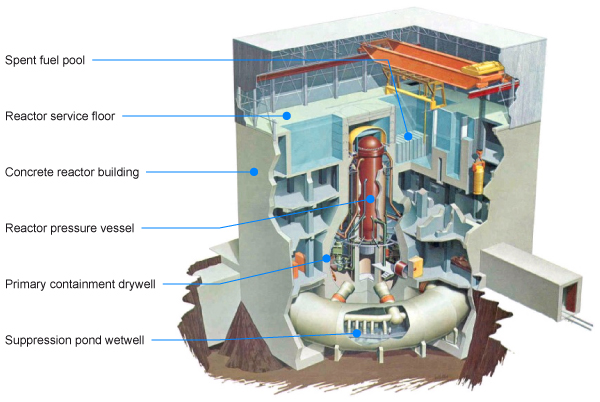On Friday, March 11, 2011 at 2:46 in tragic incident hit Great East Japan. An earthquake with a magnitude of 9.0 had hit but that wasn’t all. This earthquake was so massive it gave a rare and complex double quake that had a severe lasting of three minutes. Following this earthquake was a 15-metre tsunami. This tsunami disabled the power supply and cooling of three Fukushima Daiichi reactors. Within this tragedy, all three cores of the Fukushima Daiichi reactors melted in the first three days and a total of four reactors were written off because of the incident.
This earthquake and tsunami duo cost plenty of damage to Japan, imaginably so.
- the tsunami inundated about 560 sq km
- resulted in human death toll of over 19,00
- and created damage to coastal ports and town with over a million buildings destroyed or partially collapsed
Fukushima Plants:
there was the Daiichi and the Daini. The Daiichi was built at 3.1 based on assessments from the Chile tsunami and revisions made in 2002, but unfortunately after this accident it was under some 5 meters of seawater. The Daiichi was the most affected. The earthquake itself didn’t cause any harm to the reactors, in fact he operating units 1-3 were shut down because of it.

“When the power failed at 3.42 pm, about one hour after shutdown of the fission reactions, the reactor cores would still be producing about 1.5% of their nominal thermal power, from fission product decay”. From the moment the tsunami hit, till the days after things went downhill. world-nuclear.org has a wonderful chart explain what shut down and and what time it happened.
Event sequence following earthquake (timing from it: 14:46, 11 March)
| Unit 1 | Unit 2 | Unit 3 | |
|---|---|---|---|
| Loss of AC power | + 51 min | + 54 min | + 52 min |
| Loss of cooling | + 1 hour | + 70 hours | + 36 hours |
| Water level down to top of fuel* | + 3 hours | + 74 hours | + 42 hours |
| Core damage starts* | + 4 hours | + 77 hours | + 44 hours |
| Reactor pressure vessel damage* | +11 hours | uncertain | uncertain |
| Fire pumps with fresh water | + 15 hours | + 43 hours | |
| Hydrogen explosion (not confirmed for unit 2) | + 25 hours service floor |
+ 87 hours suppression chamber |
+ 68 hours service floor |
| Fire pumps with seawater | + 28 hours | + 77 hours | + 46 hours |
| Off-site electrical supply | + 11-15 days | ||
| Fresh water cooling | + 14-15 days | ||
* according to 2012 MAAP analysis
There was so much damage because of this such as fuel ponds and radioactive that was released into air. Due to this people where evacuated from the zone, that by March 12th was extended to 20 km from the plant.
Damages from this disaster lasted till December of that year.
Japan’s New Strategy:
Although there was a promise made by a previous government, approved was a strategy first proposed by the government of Prime Minister Shinzo Abe. “This plan summarizes Japan’s challenges of policies to be tackled, and its lines of long-term, comprehensive and systematic energy policy”. Since this accident there has been an immense amount of things done to prevent an incident of this magnitude to happen again. The radioactive in the water has been recorded stable as of 2015.
References:
- http://www.world-nuclear.org/info/safety-and-security/safety-of-plants/fukushima-accident/
- http://www.nytimes.com/2014/04/12/world/asia/japan-new-energy-strategy-approved.html?_r=0
- http://www.enecho.meti.go.jp/en/category/others/basic_plan/pdf/4th_strategic_energy_plan.pdf
